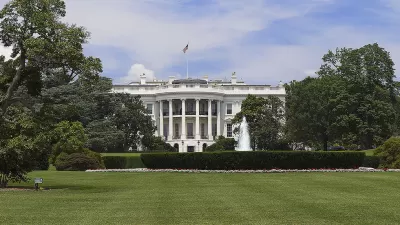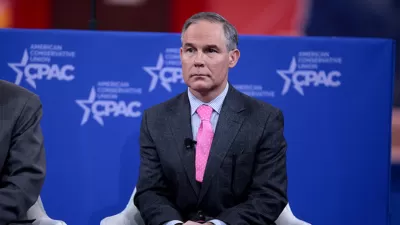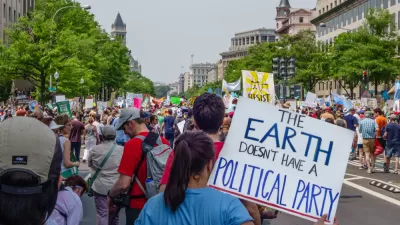In a move that surprised some, the Fourth National Climate Assessment found that climate change is "unambiguous" as opposed to a "hoax," as President Trump has stated, and that it is man-made, largely caused by the burning of fossil fuels.

Make no mistake, the Trump administration was required by law to release the Fourth National Climate Assessment, as noted by Planetizen upon the release of the third assessment in May 2014:
The assessments were initiated under President George H. W. Bush in 1989 and "mandated by Congress in the Global Change Research Act (GCRA) of 1990 to 'assist the Nation and the world to understand, assess, predict, and respond to human-induced and natural processes of global change'.”
"A revised Plan shall be submitted at least once every three years," according to the legislation.
That didn't stop speculation that the climate deniers in the administration, most notably U.S. Environmental Protection Agency Administrator Scott Pruitt, who doesn't acknowledge a connection between carbon dioxide, human activity, and climate change, would allow the report to be released.
"While there were pockets of resistance to the report in the Trump administration, according to climate scientists involved in drafting the report, there was little appetite for a knockdown fight over climate change among Mr. Trump’s top advisers, who are intensely focused on passing a tax reform bill — an effort they think could determine the fate of his presidency," report Lisa Friedman and Glenn Thrush for The New York Times on Nov. 3.
The product of hundreds of experts within the government and academia and peer-reviewed by the National Academy of Sciences, it is considered the United States’ most definitive statement on climate change science.
So, how did the administration respond to the report, compiled by 13 of its own agencies, including the EPA (which significantly chose not to acknowledge its release), which concluded:
The global, long-term warming trend is “unambiguous,” and there is “no convincing alternative explanation” that anything other than humans — the cars we drive, the power plants we operate, the forests we destroy — are to blame.
Raj Shah, a White House spokesman, focused on the 'uncertainty' noted by the authors, specifically, "the magnitude of future climate change depends significantly on ‘remaining uncertainty in the sensitivity of Earth’s climate’” to greenhouse gas emissions," write Friedman and Thrush. Not exactly an outright rejection, though.
Others saw the report as an indictment of the administration's policies on climate change.
“This report has some very powerful, hard-hitting statements that are totally at odds with senior administration folks and at odds with their policies,” said Philip B. Duffy, president of the Woods Hole Research Center. “It begs the question, where are members of the administration getting their information from? They’re obviously not getting it from their own scientists.”
General Accountability Office's assessment of climate change costs
A week earlier, the U.S. Government Accountability Office, Congress’s auditing arm, "urged the Trump administration to take climate change risks seriously and begin formulating a response" in a report released Oct. 24 on the costs to the government caused by climate change, reported Friedman on Oct. 23.
Fires, floods and hurricanes are already costing the federal government tens of billions of dollars a year and climate change will drive those costs ever higher in coming years.
...Senators Maria Cantwell, Democrat of Washington, and Susan Collins, Republican of Maine, who jointly requested the report, said between the lines of a conservative government audit was an urgent economic message that Washington should heed.
“The Government Accountability Office — if you will, the chief bean counter — is basically telling us that this is costing us a lot of money,” Ms. Cantwell said. “We need to understand that as stewards of the taxpayer that climate is a fiscal issue, and the fact that it’s having this big a fiscal impact on our federal budget needs to be dealt with.”
FULL STORY: U.S. Report Says Humans Cause Climate Change, Contradicting Top Trump Officials

Alabama: Trump Terminates Settlements for Black Communities Harmed By Raw Sewage
Trump deemed the landmark civil rights agreement “illegal DEI and environmental justice policy.”

Planetizen Federal Action Tracker
A weekly monitor of how Trump’s orders and actions are impacting planners and planning in America.

Why Should We Subsidize Public Transportation?
Many public transit agencies face financial stress due to rising costs, declining fare revenue, and declining subsidies. Transit advocates must provide a strong business case for increasing public transit funding.

Understanding Road Diets
An explainer from Momentum highlights the advantages of reducing vehicle lanes in favor of more bike, transit, and pedestrian infrastructure.

New California Law Regulates Warehouse Pollution
A new law tightens building and emissions regulations for large distribution warehouses to mitigate air pollution and traffic in surrounding communities.

Phoenix Announces Opening Date for Light Rail Extension
The South Central extension will connect South Phoenix to downtown and other major hubs starting on June 7.
Urban Design for Planners 1: Software Tools
This six-course series explores essential urban design concepts using open source software and equips planners with the tools they need to participate fully in the urban design process.
Planning for Universal Design
Learn the tools for implementing Universal Design in planning regulations.
Caltrans
Smith Gee Studio
Institute for Housing and Urban Development Studies (IHS)
City of Grandview
Harvard GSD Executive Education
Toledo-Lucas County Plan Commissions
Salt Lake City
NYU Wagner Graduate School of Public Service




























